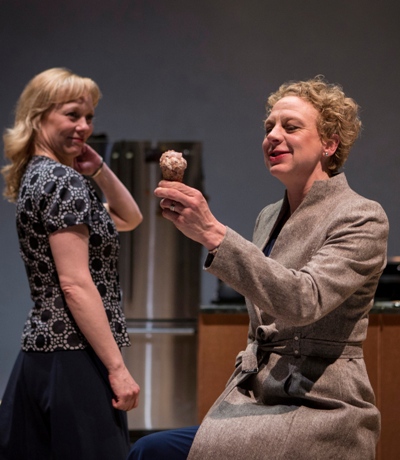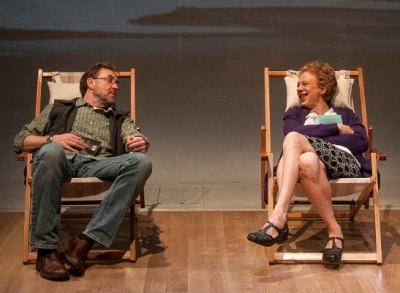Role Playing: Eva Barr explored two personas of Alzheimer’s victim to find center of ‘Alice’
 Interview: Veteran actor studied effects of dementia and character’s core personality in playwright Christine Mary Dunford’s “Still Alice,” at Lookingglass Theatre through May 19.
Interview: Veteran actor studied effects of dementia and character’s core personality in playwright Christine Mary Dunford’s “Still Alice,” at Lookingglass Theatre through May 19.
By Lawrence B. Johnson
To watch Eva Barr play out the progressive, early-onset dementia of the woman at the center of “Still Alice” at Lookingglass Theatre is to forget you’re looking at the subtle, skillful work of an actor. Yet hardly less remarkable is the way Barr arrived at the role: She began, in first readings with playwright-director Christine Mary Dunford, by taking a different part, an alternate Alice – a separate character Dunford identifies simply as Herself.
 “There’s a synergy between Alice and Herself that is essential,” says Barr. “When I was reading Herself, we had other people reading Alice, but Christine never felt it was quite right. We took a break from it, and during that time I began to think a lot about Alice and about an aunt who was very close to me, who I lost to breast cancer. I thought about how she coped with her terminal illness, and I saw connections with Alice.”
“There’s a synergy between Alice and Herself that is essential,” says Barr. “When I was reading Herself, we had other people reading Alice, but Christine never felt it was quite right. We took a break from it, and during that time I began to think a lot about Alice and about an aunt who was very close to me, who I lost to breast cancer. I thought about how she coped with her terminal illness, and I saw connections with Alice.”
So Barr, who helped to create Lookingglass in 1988 after theater studies at Northwestern University, asked Dunford if she could switch and read Alice. The playwright agreed. For the role of Herself, they called on Mariann Mayberry, a familiar face at Lookingglass and a personal friend of Barr.
“Mariann has this lively, intoxicating energy,” says Barr. “We clicked. Christine said that for the first time she was hearing the play as she wrote it.”
 Dunford’s play is an adaptation of the book “Still Alice” by Lisa Genova, about a noted expert in cognitive psychology who, at age 50, shows first signs of Alzheimer’s disease. Alice’s decline is spasmodic, punctuated by periods of clarity in which she is highly functional – only to plunge further into a confused disconnect from her family, her household, even from herself.
Dunford’s play is an adaptation of the book “Still Alice” by Lisa Genova, about a noted expert in cognitive psychology who, at age 50, shows first signs of Alzheimer’s disease. Alice’s decline is spasmodic, punctuated by periods of clarity in which she is highly functional – only to plunge further into a confused disconnect from her family, her household, even from herself.
In reshaping Genova’s book for the stage, Dunford decided to give an external voice to Alice’s extensive ruminations on her plight: Thus she created Herself, a part of Alice that might be viewed as her healthy mind, the core of her personality. While that core never disintegrates, it does grow simpler, ultimately to a state that is almost child-like. It is what remains of Alice as her agile brilliance erodes. But it is still Alice.
Though some funny stuff happens early on, comedy soon vacates the stage. The tricky part of playing Alice, says Barr, was not to overplay – but to allow her mental decline to happen progressively, indeed by irregular gradients. At one point, when the debilitating effects of Alzheimer’s are well established, Alice – once a formidable scholar and lecturer — recovers her connectivity well enough to plan and deliver a talk on her experience with the disease.
 “My grandfather had Alzheimer’s, and to watch him was eye-opening,” says Barr. “You really don’t lose the core of yourself, no matter how advanced the decline. Once I’d taken on the role of Alice, I began reading a lot about dementia and Alzheimer’s. One’s natural intelligence will affect the extreme nature of how the disease can play out.
“My grandfather had Alzheimer’s, and to watch him was eye-opening,” says Barr. “You really don’t lose the core of yourself, no matter how advanced the decline. Once I’d taken on the role of Alice, I began reading a lot about dementia and Alzheimer’s. One’s natural intelligence will affect the extreme nature of how the disease can play out.
“In those who have a strong relationship with language, the disease takes a greater toll, especially linguistically. It’s not easy to adjust. Pauses become interminable for such people because they’re accustomed to precision in their speech, and when they can’t remember the right word, they tend to just wait for it to come back to them before continuing. Alice is that way.”
But playwright-director Dunford didn’t want Alice’s affliction to be immediately apparent, Barr says. At the beginning of the play, Alice looks and sounds quite vigorous. Her first mental lapses appear to be garden variety forgetfulness. (The difference between forgetfulness and dementia has been defined, with glib reassurance, as the difference between not remembering where you put your keys and not remembering what the keys in your hand are for.)
 “A lot of Alice’s decline is right there on the page,” says Barr. “You translate that into your body. I knew where she had to get. The audience has to grow increasingly concerned for her. When she says, ‘The girl who smells like soap looks happy today,’ she’s referring to her own daughter, whom she doesn’t recognize. But Christine didn’t coach that too closely. It had to come from inside.”
“A lot of Alice’s decline is right there on the page,” says Barr. “You translate that into your body. I knew where she had to get. The audience has to grow increasingly concerned for her. When she says, ‘The girl who smells like soap looks happy today,’ she’s referring to her own daughter, whom she doesn’t recognize. But Christine didn’t coach that too closely. It had to come from inside.”
Alice’s mid-life physical health is expressed in her zeal for daily runs. (Barr took up running to look as well as feel the part.) Her mental centeredness can be read in Mariann Mayberry’s composed figure of Herself, working at a laptop or just hanging around at the edges of a scene. Herself constantly gives voice to Alice’s silent observations.
“This is Alice’s consciousness of her decline,” says Barr. “One’s relationship to oneself is essential in this journey (through Alzheimer’s). I spoke with psychologists and case workers about the sense of self in Alzheimer’s patients. It’s a gray area. By the time they’re losing touch, they’re not able to articulate it. But there is this cycle of denial, frustration, anger, frustration. A lot of the work Mariann and I did in figuring out our dynamic was on our feet.
“Sometimes Herself is very cognizant, other times Alice is holding them together. Herself is the idea of self prior to the diagnosis, and it’s important to allow for some deterioration — to let Herself go back to placid places. In Herself’s voice, we also hear Alice’s inner dialogues as she zooms out to look at this illness from a social perspective. She begins to dally with existential questions: ‘Will my brain end up the hands of biology students, under the microscope like a slice of deli ham?’”
 Meanwhile, the strain on Alice’s family – son (played by Cliff Chamberlain), daughter (Joanne DuBach) and husband (Chistopher Donahue) – nears the shattering point.
Meanwhile, the strain on Alice’s family – son (played by Cliff Chamberlain), daughter (Joanne DuBach) and husband (Chistopher Donahue) – nears the shattering point.
The son, a lawyer whose career is just starting to take wing, goes into stony denial. “He needs Alice there as she has always been for him – the high-powered, articulate mother, his model,” says Barr. “But the daughter becomes her emotional anchor. Alice’s relationship with her husband (also a college professor) is complicated. I think they love and respect each other as intellectuals, but Alice’s decline reduces her to much more of an emotional being than she ever allowed herself to be. He is unmoored by the situation.
“It’s just hard. There are no right answers, except what time lets you arrive at. It’s been a very emotional, moving play for our audiences. ‘Still Alice’ is an exhausting journey, one that profoundly affects people in ways they can’t even articulate. Christine has gently done something more than she knew.”
Related Links:
- Review of “Still Alice”: Read it at ChicagoOntheAisle.com
- Preview of Lookingglass Theatre’s complete 2012-13 season: Details at ChicagoOntheAisle.com
More Role Playing interviews:
- Darrell W. Cox sees theater’s core in closed-off teacher of ‘Burning Boy’
- Chaon Cross turned Court stage into a romper room finding answers in ‘Proof’
- Dion Johnstone turned outsider Antony to bloody purpose in ‘Julius Caesar’
- Noir films gave Justine Turner model for shadowy dame in ‘Dreadful Night’
- Anish Jethmalani plumbs agony of good man battling demons in ‘Bengal Tiger’
- Gary Perez channels his Harlem youth as quiet, unflinching Julio in ‘The Hat’
- Kamal Angelo Bolden sharpened dramatic combinations to play ‘The Opponent’
- In wheelchair, Jacqueline Grandt explores paralysis of neglect in ‘Broken Glass’
- James Ridge thrives in cold skin of Shakespeare’s smiling serpent, Richard III
- Stephen Ouimette brews an Irish tippler with a glassful of illusions in ‘Iceman’
- Ian Barford revels in the wiliness of an ambivalent rebel in Doctorow’s ‘March’
- Chuck Spencer flashes a badge of moral courage in Arthur Miller’s ‘The Price’
- Rebecca Finnegan finds lyrical heart of a lonely woman in ‘A Catered Affair’
- Bill Norris pulled the seedy bum in ‘The Caretaker” from a place within himself
- Diane D’Aquila creates a twice regal portrait as lover and monarch in ‘Elizabeth Rex’
- Dean Evans, in clown costume, enters the darkness of ‘Burning Bluebeard’
- Dan Waller wields a personal brush as uneasy genius of ‘Pitmen Painters’
- City boy Michael Stegall ropes wild cowboy in Raven Theatre’s ‘Bus Stop‘
- Brent Barrett is glad he joined ‘Follies’ as that womanizing, empty cad Ben
- Sadieh Rifai zips among seven characters in one-woman “Amish Project”
- Kirsten Fitzgerald inhabits sorrow, surfs the laughs in ‘Clybourne Park‘
- Janet Ulrich Brooks portrays a Russian arms negotiator in ‘A Walk in the Woods’
Tags: "Still Alice", Alzheimer's disease, Christine Mary Dunford, Christopher Donahue, Cliff Chamberlain, Eva Barr, Lisa Genova, Lookingglass Theatre, Mariann Mayberry


No Comment »
7 Pingbacks »
[…] Eva Barr explored two personas of Alzheimer’s victim to find center of ‘Alice’ […]
[…] Eva Barr explored two personas of Alzheimer’s victim to find center of ‘Alice’ […]
[…] Eva Barr explored two personas of Alzheimer’s victim to find center of ‘Alice’ […]
[…] Eva Barr explored two personas of Alzheimer’s victim to find center of ‘Alice’ […]
[…] Eva Barr explored two personas of Alzheimer’s victim to find center of ‘Alice’ […]
[…] Eva Barr explored two personas of Alzheimer’s victim to find center of ‘Alice’ […]
[…] Eva Barr explored two personas of Alzheimer’s victim to find center of ‘Alice’ […]